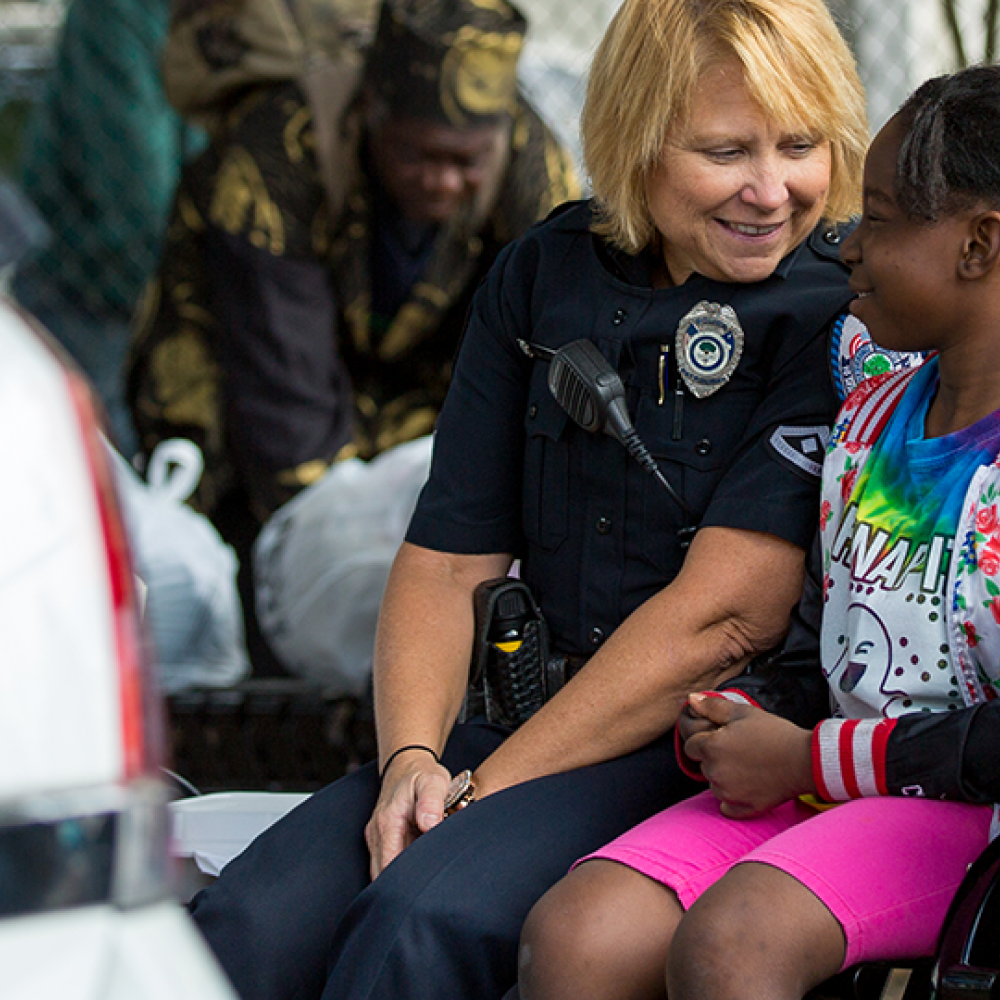
Community Trust Hub
The Community Trust Hub is a comprehensive source of information and resources for police and their community partners on how to build, repair, evaluate, and sustain community trust.
Community Trust
Expand AllCommunity trust stands as the cornerstone of effective policing and the preservation of public safety. While this notion is far from new, the intricate dynamics of community trust within the realm of policing are both profound and multifaceted. Within this complexity lies an array of approaches that police agencies can embrace to nurture and strengthen the bonds with the communities they are sworn to protect. Through intentional efforts and genuine engagement, the path to deeper trust and collaboration can be forged, illuminating a shared commitment to safety and understanding.
At its core, community trust hinges on the relationship between police officers and the communities they serve. This philosophy's roots can be traced back to Sir Robert Peel, and what is widely considered to be the establishment of the first modern police force in 1829 in London, England. Peel recognized the need for a disciplined and structured approach to policing that was embedded in and driven by the local community. Peel introduced the Nine Principles of Policing to emphasize the importance of earning the support of the public, community cooperation, ethical conduct, and the notion that the police are fundamentally members of the public in uniform.
Peel’s principles highlight the idea that effective policing relies not only on enforcement but also on building positive relationships with community members. This philosophy underscores the necessity of mutual respect and understanding, which are essential for fostering community trust. These principles remain highly relevant today as police agencies grapple with issues of accountability, transparency, and bias. In an era marked by social movements advocating for reform, the historical context of Peel’s principles serves as a reminder that community trust is not merely an ideal but a critical component of policing. As modern police forces seek to enhance their legitimacy, the foundational ideas of community engagement and partnership with the public, as articulated by Peel, continue to guide efforts toward building a safer and more just society.
By revisiting and applying these enduring principles, police agencies can work to restore and enhance community trust, ensuring that policing is viewed not only as a mechanism of control but as a collaborative effort aimed at the common good.
- The basic mission for which the police exist is to prevent crime and disorder.
- The ability of the police to perform their duties is dependent upon public approval of police actions.
- Police must secure the willing co-operation of the public in voluntary observance of the law to be able to secure and maintain the respect of the public.
- The degree of co-operation of the public that can be secured diminishes proportionately to the necessity of the use of physical force.
- Police seek and preserve public favor not by catering to public opinion but by constantly demonstrating absolute impartial service to the law.
- Police use physical force to the extent necessary to secure observance of the law or to restore order only when the exercise of persuasion, advice and warning is found to be insufficient.
- Police, at all times, should maintain a relationship with the public that gives reality to the historic tradition that the police are the public and the public are the police; the police being only members of the public who are paid to give full-time attention to duties which are incumbent on every individual in the interests of community welfare and existence.
- Police should always direct their action strictly towards their functions and never appear to usurp the powers of the judiciary.
- The test of police efficiency is the absence of crime and disorder, not the visible evidence of police action in dealing with it.
Community trust refers to the mutual confidence, respect, and cooperation between police agencies and the communities they serve. Trust is built through sincere interest, collaboration, and commitment to justice and requires engaging with the community in a transparent, accountable, and respectful manner, actively listening to concerns, and addressing issues promptly and effectively. Strong community trust with police is essential for effective crime prevention, investigation, and overall societal well-being. Building community trust is an ongoing effort that is infused in all aspects of policing and benefits from being evaluated regularly to ensure the public safety goals of both the police and community are aligned. Community trust can be shaped not only by the actions of an individual department but also by the actions of other policing entities in surrounding areas and at the national or global level.
Community trust is vital to effective policing, public safety, and supporting the safety and well-being of both officers and the community members they serve. This trust can help foster a safe and cooperative environment where police agencies and officers effectively carry out their duties and community members feel respected, protected, and served.
Building community trust is an intentional and ongoing engagement process, specifically reflected in an agency’s vision, mission, values and culture. This operational philosophy drives how the agency conducts itself at every level, where building trust is a key component of how it operates.
Elements of community trust building include:
Leading your agency to create and sustain an organizational culture that prioritizes community trust.
Integrating community trust building as a priority and focus throughout agency policies, culture, practices, and daily activities.
Training personnel in effective policing, communication, and trust building practices.
Partnering with the community to build trusting relationships and create a sense of shared responsibility for community safety.
Communicating effectively within the agency and with the community.
Evaluating community trust building efforts to continually measure effectiveness, identify ways to improve, and respond to emergent needs.
About the Community Trust Hub
The Community Trust Hub, developed by the International Association of Chiefs of Police (IACP) and the Education Development Center (EDC), with support from the Bureau of Justice Assistance (BJA), Office of Justice Programs, U.S. Department of Justice (DOJ), identifies strategies, promising practices, and resources for building public trust.
The Community Trust Hub was supported by Cooperative Agreement No. 2018-BJ-BX-K035 awarded by the Bureau of Justice Assistance, Office of Justice Programs, U.S. Department of Justice. The opinions contained herein are those of the author(s) and do not necessarily represent the official position or policies of the U.S. Department of Justice. References to specific agencies, companies, products, or services should not be considered an endorsement by the author(s) or the U.S. Department of Justice. Rather, the references are illustrations to supplement discussion of the issues.


